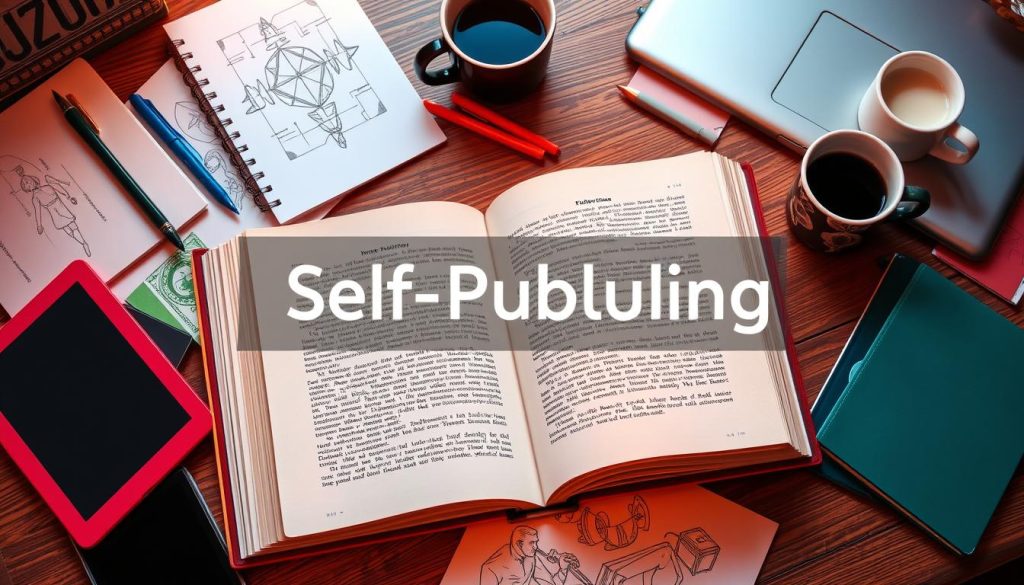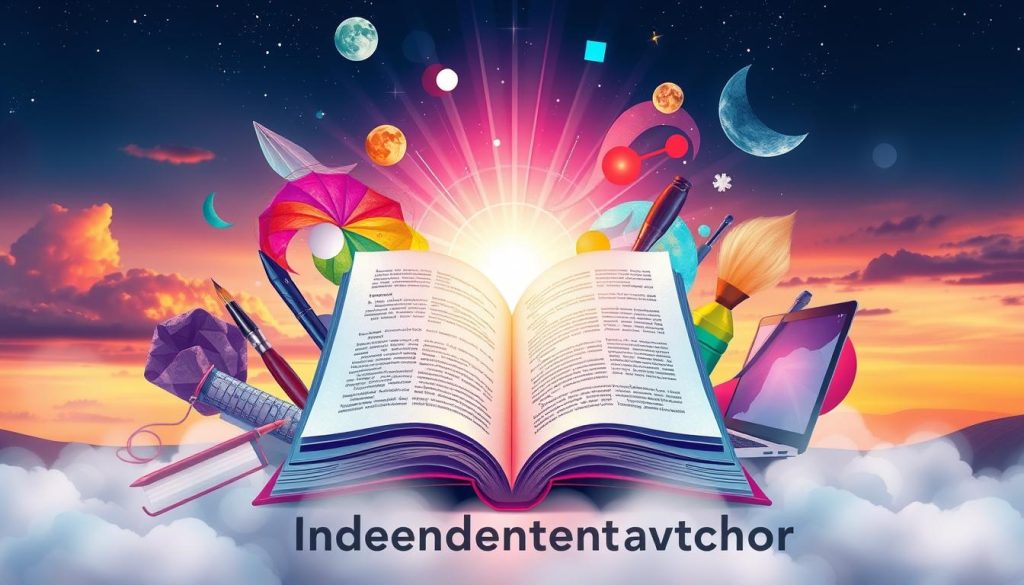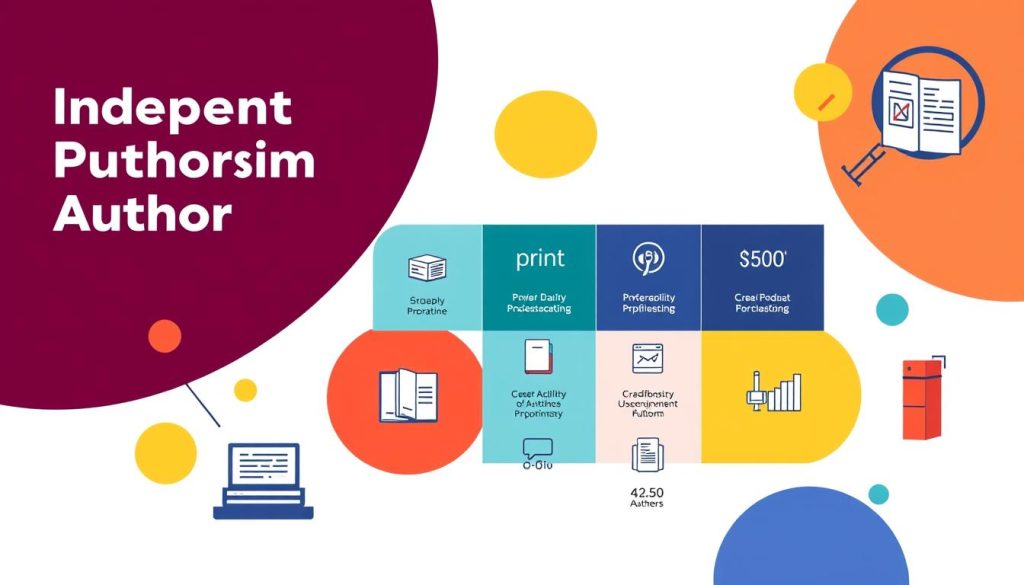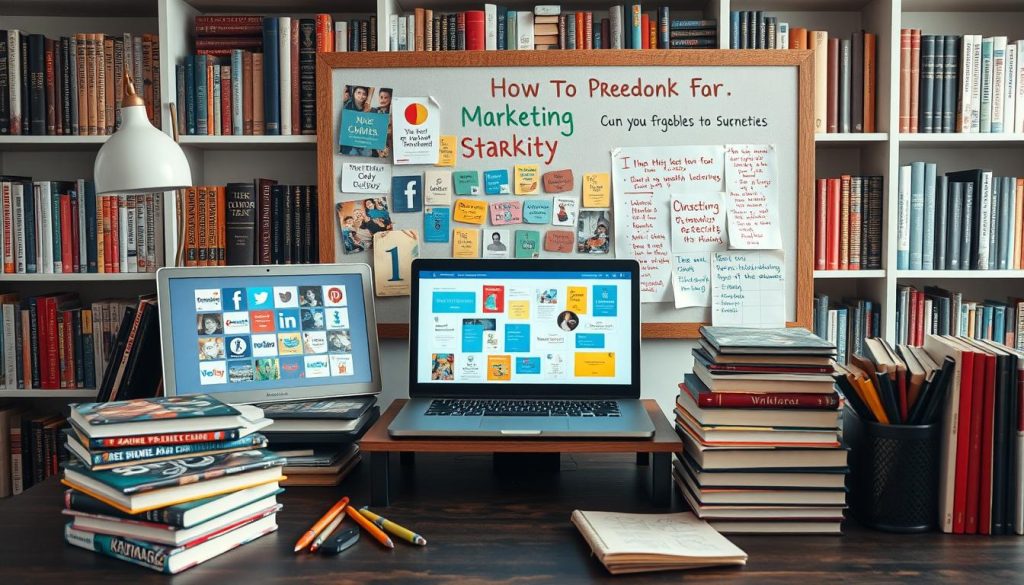In today’s changing literary world, becoming an independent author is easier than ever. Self-publishing has given aspiring indie writers the power to control their creative paths. Unlike traditional publishing, independent authors can connect directly with readers, building a unique literary career. This change encourages creativity and offers many resources and chances for those wanting to stand out in literature. If you’re looking for advice from an author or want to start self-publishing, this guide will show you the way.
The Rise of Independent Authors

The world of books has changed a lot in recent years. Indie authors are now more popular than ever. This change is thanks to new ways of publishing that let writers share their stories without traditional publishers.
Readers now want different kinds of stories, which has helped indie authors grow. They like stories from diverse voices and unique perspectives.
More and more indie authors are publishing their work. In the UK, the number of self-published books has gone up a lot. This shows how many more indie books are out there compared to traditional ones.
Amazon Kindle Direct Publishing has been key to this change. It lets authors reach readers directly. This platform helps writers take control of their work, avoiding traditional publishers.
New platforms like these are changing how authors work. They celebrate creativity and individuality. As technology gets better, indie authors will have even more chances to succeed in the book world.
Understanding Self-Publishing

Self-publishing has changed the way books are made and shared. It lets authors control their own publishing path. This guide covers key parts, benefits, and challenges of self-publishing for new writers. Authors can set their own schedules, pick how their book is published, and keep full rights to their work. They also get to use many platforms that make preparing and sharing their books easy.
One big plus of self-publishing is saving money. Authors skip traditional costs like agent fees and printing fees. This lets them spend more on marketing and design. Many people think self-published books are not as good, but that’s not true. Thanks to better editing and design tools, and professional services, self-published books can be just as good as those from big publishers.
Self-publishing has its ups and downs. Authors need to handle marketing, building a platform, and getting their book out there. With the right tools and a good self-publishing guide, these challenges can be easier. Taking this path means more creative freedom and a chance for success.
Become an Independent Author

The journey of an independent author marks a big change in storytelling. It’s not just about writing. It’s about making choices in self-publishing too. Authors get to decide on their stories and how to share them with the world.
This freedom lets authors connect deeply with their readers. It builds a strong fan base.
Defining the Independent Author Journey
Being an independent author means you choose what to write and how to share it. You take charge of your work. Online platforms let authors share their stories freely, without traditional publishing limits.
Benefits of Independence in Writing
Independence in writing means more than just creative freedom. Authors get to keep more of their earnings. This lets them invest in their work and try new things.
They can write about what they love without worrying. This builds a close bond with readers. It creates a community that supports and connects with the author’s work.
Choosing Your Genre and Niche

Becoming a successful indie author starts with picking the right genre and finding your niche. It’s key to know what your readers like. This choice is crucial for your marketing and book sales.
Identifying Your Target Audience
There are ways to find out who your readers are. Do market research and look at who reads your type of books. Here are some tips:
- Use social media to talk to potential readers and see what they like.
- Do surveys or join forums related to your genre.
- Look at successful authors in your niche to see how they connect with their readers.
Knowing what your readers want helps you write better. This makes you more likely to succeed.
Market Trends in Independent Publishing
Keeping up with indie publishing trends can help your writing career. Genres like romance, fantasy, and self-help are very popular. Here are some current trends:
- There’s a big demand for stories with diverse characters.
- Readers like shorter, easy-to-read content.
- Interactive stories and multimedia are getting more popular.
By watching these trends, indie authors can make smart choices. This helps them connect better with their readers and market.
Creating a Compelling Manuscript

Writing a captivating manuscript is key for any new author. A great book needs a story that grabs readers. Authors must learn various writing skills to make their stories engaging and unforgettable.
Start with the basics of storytelling. This includes developing characters, building a plot, and setting the scene. Characters should be real and easy to relate to. A good story has heroes and obstacles that make readers feel for the characters.
Using the right plot structure helps the story flow better. Consider frameworks like the three-act structure or the hero’s journey. These methods help organize your story and keep readers hooked.
For better writing, try writing workshops and use special software. These tools help authors improve, get feedback, and tweak their work. Techniques like free writing or outlining can also help you find your unique voice and style.
By combining strong storytelling with effective writing skills, you can create a manuscript that leaves a mark on readers.
The Importance of Editing and Proofreading

Editing and proofreading are key to making your manuscript the best it can be before it’s published. They involve developmental editing, copyediting, and proofreading. Each stage is crucial for improving your work. Knowing these steps is vital for polishing your writing.
Finding Professional Editors
It’s important to find editors with the right skills to boost your manuscript’s quality. There are great platforms that connect you with experts. Here are some options:
- Reedsy – A marketplace connecting authors with experienced editors.
- Editorial Freelancers Association – A resource for locating freelance editors across various specialisations.
- LinkedIn – A platform for networking with professionals in the editing field.
Using these resources helps you find qualified editors. They can help you navigate the editing process. This ensures your work is engaging and polished.
Self-Editing Techniques
For authors who want to improve their work before getting outside help, self-editing is key. Here are some effective methods:
- Read aloud – This technique helps spot awkward phrases and mistakes.
- Peer feedback – Sharing your work with trusted friends can offer new insights and helpful advice.
- Take breaks – Stepping away from your work lets you come back with fresh eyes and spot errors more easily.
These self-editing tips will make your manuscript better. They prepare it for the detailed editing and proofreading that come next.
Designing Your Book Cover

The design of a book cover is crucial in grabbing readers’ attention and making them want to buy. It combines different elements to show what your book is about. Knowing how to design a cover that speaks to your readers is key.
Understanding Cover Design Principles
Key principles in book cover design include:
- Typography: The choice of font reflects the book’s genre and tone. Clear fonts make it easier to read.
- Imagery: Visuals should match the book’s theme. High-quality images create a strong emotional link with readers.
- Colour Schemes: Colours trigger emotions and set the mood. Choosing the right colours is vital for the story’s feel.
Following these tips will help you create a cover that looks great and grabs attention.
Hiring a Professional Designer
Working with professional designers can greatly improve your book cover. Sites like 99designs or Fiverr have many skilled designers for book covers. When looking for a designer, have a clear brief ready. It should include your vision, who you’re writing for, and what you want in the design. This makes sure the final cover meets your expectations.
Developing Your Author Platform

Creating a strong author platform is key to reaching readers and promoting your books. It’s the base of your online presence. It helps you connect with your audience and build a community. Social media and website development are crucial parts of this.
Building a Social Media Presence
Having a strong social media presence helps you reach out to potential readers. Here are steps to boost your engagement:
- Choose platforms that fit your audience, like Twitter, Facebook, or Instagram.
- Share content that shows your writing style, including snippets, personal stories, and behind-the-scenes looks.
- Interact with followers by responding to comments and joining in on discussions.
- Use hashtags and join writing groups to get more people to see your work.
Creating an Author Website
An author website is vital for your platform. It lets you show off your work and gain credibility. Make sure your website has these features:
- A professional bio that talks about your writing journey and successes.
- A portfolio of your published works, with links to buy or download them.
- A blog for sharing insights, updates, and deepening connections with readers.
- A newsletter sign-up form to get emails from readers who want to stay in touch.
Navigating the Self-Publishing Process

The self-publishing process lets indie authors share their work without needing traditional publishers. This guide covers the key steps from writing your book to getting it out there.
First, authors need to finish their manuscript. This means editing and proofreading to make sure it’s top-notch. After that, think about the book cover. A great cover can really grab people’s attention.
Then, plan how you’ll publish your book. You can choose between eBooks and print-on-demand. Places like Amazon-KDP, IngramSpark, and local bookshops offer different ways to share your work. It’s important to know the good and bad of each choice to pick what fits your goals.
- Setting Timelines: Make a realistic plan for each step in publishing to keep moving forward.
- Budgeting: Think about the costs of publishing, like design, editing, and marketing.
- Distributing Your Book: Learn about how to get your book out there to reach your readers.
By following these steps, new authors can confidently go through the self-publishing process. They can use the resources available to them to succeed in the competitive book world.
Choosing the Right Publishing Platform

Choosing the right publishing platform is key to an independent author’s success. With many options out there, comparing them can help find the best fit. Making an informed choice can boost visibility and earnings.
Comparing Key Platforms
Authors often look at popular platforms like Amazon KDP, Smashwords, and Lulu. Each offers unique benefits for indie authors.
- Amazon KDP: KDP has a huge audience and offers good royalties. But, it requires authors to sell only on Amazon, limiting other sales channels.
- Smashwords: This platform is great for reaching many readers, including libraries and retailers. It might be harder to learn, but it can lead to more sales.
- Lulu: Perfect for authors wanting physical books, Lulu has many print options. It’s not the top choice for eBooks, but its print tools are strong.
Think about your book’s genre, audience, and marketing plans when picking a platform. These factors will guide your choice, making sure it matches your goals.
Marketing Your Independent Book

Marketing is key to the success of indie books. A good plan can boost visibility and draw in readers. Using different marketing tools and connecting with other authors can help your book stand out. Here are some tips for your marketing strategy.
Effective Strategies for Promotion
Good marketing mixes online and offline methods. Some top ways to promote your book include:
- Running social media campaigns to make people talk about your book.
- Working with book bloggers for reviews and wider reach.
- Sending out email newsletters to keep readers updated on new books and events.
- Hosting book signings and virtual tours to meet readers face-to-face.
- Advertising on Goodreads to find more readers.
Networking with Other Authors
Connecting with other authors can help indie authors a lot. Being part of writing groups means sharing resources and working together on promotions. Think about these ideas:
- Going to local author events and book fairs.
- Talking in online forums for indie publishing.
- Working with other authors on joint promotions and social media events.
Engaging with Readers and Building a Community

Getting readers involved is key to building a loyal following and a supportive community for authors. By interacting thoughtfully, authors can turn casual readers into dedicated fans. Social media is a powerful tool for this, letting authors talk directly to their audience and make them feel part of a group.
Utilising Social Media for Reader Engagement
Social media helps authors connect deeply with their readers. Here are some ways to boost reader engagement on these platforms:
- Do regular Q&A sessions to answer reader questions and start conversations.
- Run giveaways to thank loyal readers and get them excited about new books.
- Share what goes on behind the scenes of writing, giving readers a peek into your world.
- Ask for reader feedback and reply to comments to build personal connections.
- Start themed posts or discussions to get readers talking and sharing their thoughts.
Building a community for authors on social media creates a place where readers feel important. This kind of interaction helps authors understand what readers like and keeps them supporting new projects.
Understanding ISBNs and Copyright

Every independent author needs to understand the importance of ISBNs and copyright. The ISBN helps readers and booksellers find and share books. Authors can get an ISBN from Nielsen in the UK, making their books easy to track.
Copyright is key to protecting an author’s creative work. It stops others from using or copying their work without permission. To protect your work in the UK, keep records of how you created it. This can prove you own the work if there’s a dispute.
Knowing about ISBNs and copyright boosts confidence in self-publishing. With an ISBN and copyright, authors can protect their work. This makes publishing and promoting books easier.
Royalty Structures and Earnings

Self-publishing offers authors a chance to make good money with their own royalty deals. It’s key to know how these deals work to make the most of your earnings. Unlike traditional publishing, where authors get a small cut, self-publishing lets writers keep a bigger part of their earnings.
Understanding Royalties in Self-Publishing
Platforms like Amazon Kindle Direct Publishing and IngramSpark offer different royalty rates. Authors can earn between 35% to 70% on ebook sales, based on how they price and distribute their work. Picking the right price is crucial for getting noticed and making a profit.
- Set competitive prices to attract readers while ensuring a healthy profit.
- Consider promotional periods for boosting visibility without undercutting earnings long-term.
- Examine different royalty structures for print vs. digital formats to optimise revenue.
Payment times for authors vary, usually between 30 to 60 days. Knowing this helps with financial planning. In short, understanding royalty structures is key to doing well in self-publishing.
The Long-Term Commitment of Being an Author

Starting as an independent author means more than just writing. It’s a long-term commitment that needs a strategic plan, persistence, and hard work. You must keep pushing yourself in different areas to stand out in a tough market.
Building a writing career takes a lot of effort. You’ll need to focus on several key areas. These include:
- Writing regularly to improve your skills and find your unique voice.
- Creating strong marketing plans to connect with readers.
- Networking within the writing community to make important connections.
The path of an author is always changing. Set goals that match your dreams and adjust them as the market changes. This keeps you motivated, even when things get tough.
Staying committed to learning new things is key to a successful writing career. Keep learning new techniques, try different genres, and listen to what readers and other writers say. This way, you’ll make a mark in the literary world and achieve your long-term goals.
Continuing Education and Writing Resources
For independent authors, the journey doesn’t stop after you publish. It’s key to keep learning to get better and stay ahead. There are many online places like MasterClass and Coursera with courses for writing and publishing. These sites offer great insights to improve your writing and try new things to grab your readers’ attention.
Writer workshops are also great for boosting your creativity and writing style. They let you get feedback from others and make new connections. These connections can lead to working together or finding a mentor. Keeping up with the latest in publishing at conferences and through books helps authors stay current and successful in self-publishing.
Putting time into learning new things keeps independent authors fresh and driven. Using different resources can spark new ideas, help you understand stories better, and give you the tools to beat writing hurdles. See education as a lifelong journey, and watch your writing grow as you do.
















